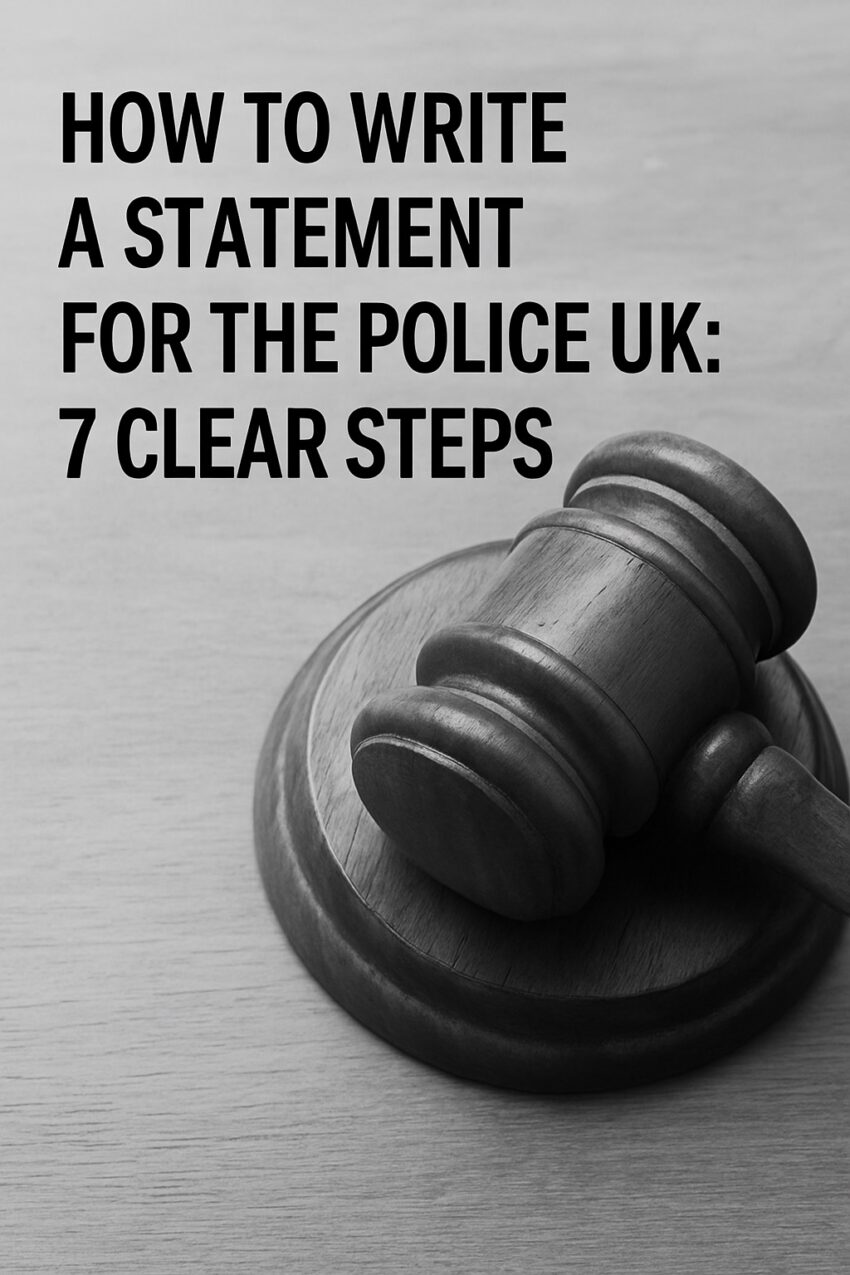How to Write a Statement for the Police UK: 7 Clear Steps
How to write a statement for the police UK can feel overwhelming, especially when emotions are high and the system feels intimidating. This guide breaks it down into clear steps, so you can write confidently — whether you’re reporting a crime, giving a witness account, or supporting someone else’s case.
Your statement may be used as evidence. It’s important that it reflects your truth as clearly and calmly as possible.
What Is a Police Statement?
A police statement is your written or recorded account of what happened. It becomes part of the official investigation. You might be asked to give one if:
- You’re the victim of a crime
- You witnessed something important
- You’re supporting someone else who reported something
In the UK, most statements are taken in person or by phone, then typed up and signed. You also have the right to write one yourself and submit it — especially if you want to explain something clearly before giving a video or verbal interview.
Many people never learn how to write a statement for the police UK, especially if it’s their first time dealing with the system.
If you’re unsure how to write a statement for the police UK officers will take seriously, focus on facts, order, and clarity over emotion.
️ How to Write a Statement for the Police UK: 7 Steps
1. Start with Basic Details
Begin with your name, age, and the date you’re writing the statement. You can also include your contact details if appropriate.
2. State the Purpose of the Statement
Write a sentence like: “This statement is in relation to the incident that occurred on [date] involving [person or event].”
3. Describe What Happened — In Order
This is the core of your statement. Try to stick to facts, even if you’re emotional. Include:
- Where you were
- What time it was
- What you saw, heard, or felt
- What happened next
If you’re unsure of the exact time or sequence, say so. Use phrases like “I believe it was around 10 pm” or “To the best of my memory…”
4. Include Quotes and Descriptions
If someone said something important, quote it exactly if you can. Example: “He shouted, ‘Don’t move or I’ll hit you.’”
Describe physical appearances, clothing, locations — anything you remember that could be relevant.
5. Add How You Felt (Briefly)
This isn’t a victim impact statement, so keep emotional reactions brief. But it’s okay to write things like:
- “I felt scared and froze on the spot.”
- “I was shaking afterwards and couldn’t speak clearly.”
This helps paint a fuller picture without turning the statement into a narrative.
6. End with What Happened Next
Include what you did afterwards: called the police, spoke to a friend, went to hospital, etc. This can help support timelines and add credibility.
7. Sign and Date It
At the end, write: “This statement is true to the best of my knowledge.” Add your signature and today’s date.
✏️ Police Statement Example
My name is Jane Smith. I am 38 years old, and this statement is in relation to the incident that occurred on 14 March 2023 at approximately 9.45 pm.
I was walking home along Albert Street in Blackpool when I noticed a man following me. He was wearing dark jeans and a grey hoodie with the hood up. I crossed the road, but he followed. I started walking faster. He then shouted, “Oi, come here,” and began running.
I ran to the shop at the end of the street and waited inside until he disappeared. I was shaking and called my sister. Later that night, I called 101 and reported the incident.
This statement is true to the best of my knowledge.
Signed: Jane Smith | Date: 15/03/2023
Tips for Staying Grounded While Writing
- Take breaks if you start to feel overwhelmed
- Don’t try to sound “official” — plain English is best
- Write in your own voice, not how you think police want to hear it
- It’s okay if it’s messy — honesty is more important than grammar
Writing clearly matters, but how to write a statement for the police UK style doesn’t mean it has to be robotic. Speak honestly and simply.
These steps are written to guide you through how to write a statement for the police UK without stress or legal confusion.
More Support for Survivors
If you’re unsure what to include or want to process your experience first, we’ve created tools for that. Our Closure Letter Kit helps survivors draft powerful statements, letters, and reflections in a way that’s structured but gentle.
And if you’re not ready to give a statement yet, that’s okay too. You have the right to go at your own pace.
Trusted Resources
For more guidance on your rights and how to submit a statement in the UK, visit www.victimsupport.org.uk. They offer free, confidential support and legal resources tailored to survivors of crime.
❓ Frequently Asked Questions
Can I write my statement before speaking to the police?
Yes. You can write and bring a prepared statement to help you stay clear and calm. You can also ask to read from it during a video interview.
Do I need a solicitor to write a police statement?
No, not usually. But if you’re under investigation or unsure of your rights, seek legal advice before submitting anything.
What if I forget details?
Just say so. It’s okay to write “I don’t remember exactly” or “I’m not sure if this happened before or after that.” Honesty matters more than perfection.
Even if you’re nervous, this guide on how to write a statement for the police UK helps you stay clear and supported from the start.
Remember, how to write a statement for the police UK isn’t something most people are taught — this guide gives you that missing support.

